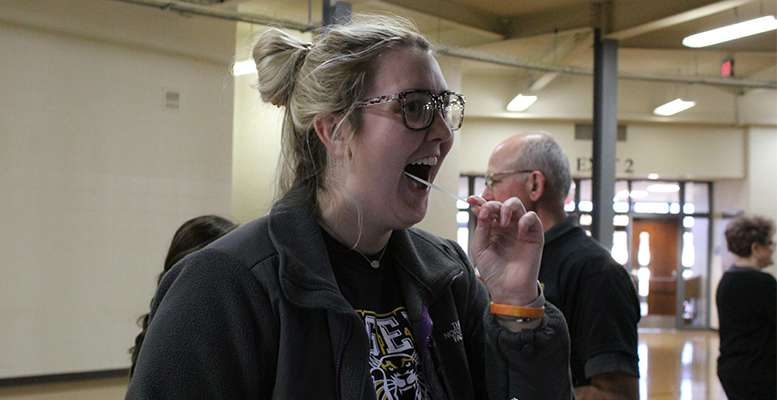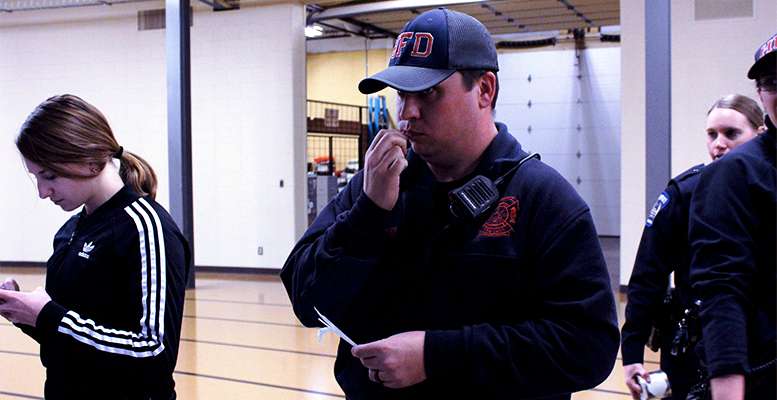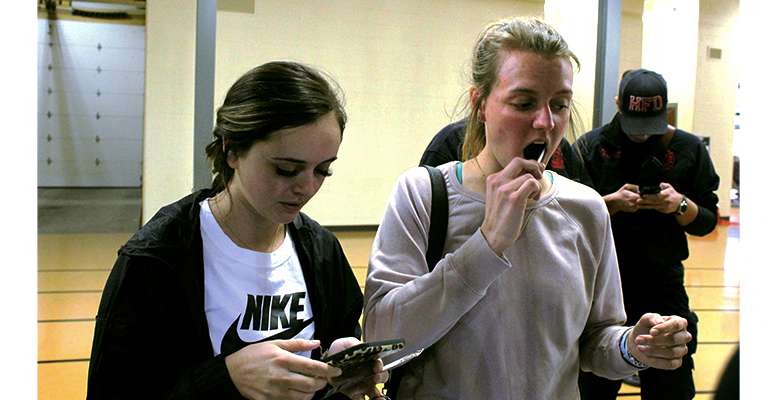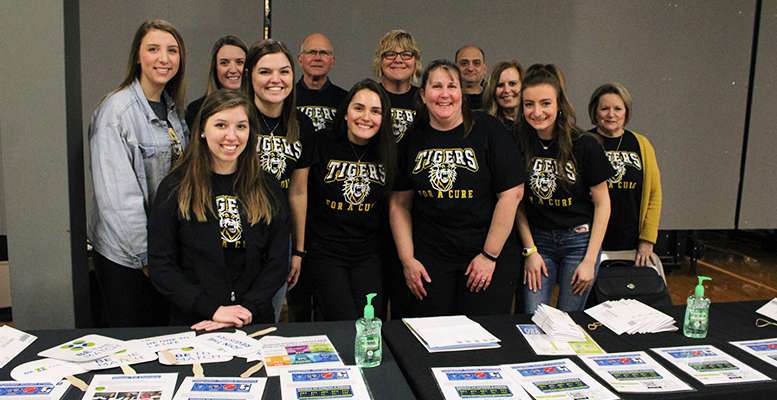
By CRISTINA JANNEY
Hays Post
Usually Tiger basketball games are a time to have fun — cheer the home team, eat some popcorn — but students and community members at Feb. 6 game took a few minutes to stop and potentially save a life.
FHSU student health sponsored a Be the Match bone marrow registry drive.
Potential donors ages 18 to 44 answered a list of qualifying health questions on their smartphones and then swabbed their cheeks to be matched with a potential cancer sufferer in need of bone marrow transplants.

Kathy Pyke of Hays knows too the well the importance of the registry. Pyke was at Gross Memorial Coliseum the night of the drive as a volunteer handing out information to potential donors.
Her husband, Tom, was diagnosed with leukemia on March 1, 2014. Family members were tested, and they were not matches. Doctors were also unable to find a bone marrow match on the national registry. There were 6.2 million people in the registry at the time.
In lieu of a bone marrow transplant, Pyke was given donated umbilical cord blood.
Initially the treatment improved Pyke's condition. However, he ultimately died as a result of the disease on Feb. 12, 2015 at the age of 62.

Kathy said the family was rocked by Tom's illness. He was playing golf and went fishing the week before he was diagnosed with cancer.
Kathy said she wishes she could be on the registry to help another family, but her age prevents her from doing so.
"Not only for my husband," she said of the importance of the registry. "I did pray there had been a match. We stayed at the Hope Lodge that was run by the American Cancer Society in Kansas City. There were 45 apartments there and everyone there has someone who has cancer plus a caregiver in it. You just see so many lives being touched. ...
"If this is something that can help somebody, it is just an easy thing to do."

Kathy said she had a good friend who had a family member sign up for the registry, and he was able to donate to someone who had cancer in England.
Pyke said she would also like to see more hospitals participate in the cord blood bank, which is what helped her husband. At the time of Tom's illness, HaysMed was not participating in the umbilical cord blood bank.
Michelle Toogood, BSN, RN, supervisor of Hays Med’s Women's and Infant Care Center/NICU, said parents wishing to participate in cord blood donation should initiate the process prior to delivery. HaysMed staff will then aid in the collection of the specimen.
"I just can't express how much people need to do this," Pyke said of signing up for the registry. "It is just so easy to swab test and they could potentially save more than one person's life. It is so easy to do and so important."
If you are identified as a match to someone suffering from cancer, you would be contacted through the registry and asked if you are willing to donate, Amanda McCord, RN at the FHSU student health center.
"Finding the perfect match is essential for people who are fighting this type of cancer," McCord said. "The closer the match the better their chances of remission and beating whatever cancer they are fighting."

There are over 70 diseases that can be treated by bone marrow transplants, according to Be the Match.
Physicians will usually look for matches among relatives first, but only 70 percent of the time are matches made from family members, McCord said.
Statistics also indicate minority patients are less likely to find matches than Caucasian patients. Be the Match is trying to boost minority participation as there are fewer minority participants in the registry at this time, McCord said.
Donating bone marrow is a little bit different for every donor, McCord said.
Most give through a Peripheral Blood Stem Cell (PBSC) donation. A machine draws blood from one arm, extracts the cells it needs, and returns the remaining blood through your other arm, according to the Be the Match website.
Others give through a marrow donation. Liquid marrow is withdrawn from the back of your pelvic bone with a needle. In this case, you’ll receive anesthesia and feel no pain during the procedure, the Be the Match website said.
According to Be the Match, PBSC donors may experience headaches or body aches several days before collection, but these disappear shortly after donation. Most donors feel completely recovered within a few weeks.
If you missed the Be the Match event at FHSU last week, you can contact Be the Match though its website, and the organization will send you the cheek swab kit to sign up for the registry.
The Be the Match website also has information on the donation process and a link to make monetary donations to the Be the Match program.






